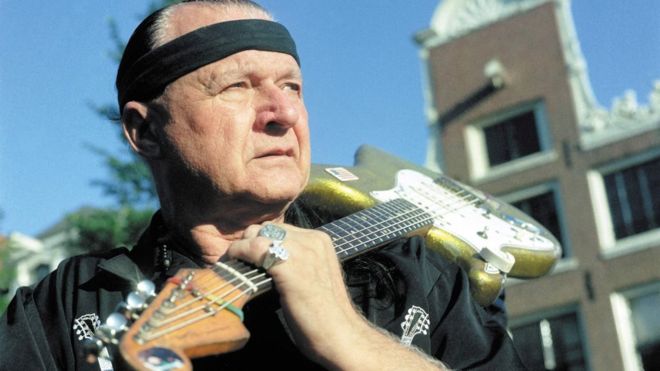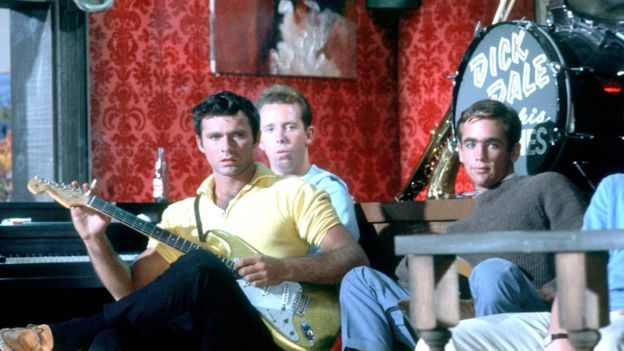 Surf guitar pioneer Dick Dale, whose song Misirlou played over the opening credits to Quentin Tarantino’s Pulp Fiction, has died aged 81.
Surf guitar pioneer Dick Dale, whose song Misirlou played over the opening credits to Quentin Tarantino’s Pulp Fiction, has died aged 81.
Dale was known for his blindingly fast strumming style, which inspired acts like The Beach Boys and Jimi Hendrix.
He said the sound reminded him of the rumble and crash of the waves, and the noises of marine animals as he surfed in California.
Dale’s bassist Sam Bolle confirmed the star had died on Saturday night.
The cause of death is not yet known, but the guitarist had a long history of ill health, including renal failure, diabetes and cancer.
Dale’s agent called his death “a sad day for rock ‘n’ roll”.
 Celebrities and fans have been paying tribute to the musician referred to as the “King of the Surf Guitar” and the “Pied Piper of Balboa Beach”, with many describing him as a “true innovator”.
Celebrities and fans have been paying tribute to the musician referred to as the “King of the Surf Guitar” and the “Pied Piper of Balboa Beach”, with many describing him as a “true innovator”.
And recording industry body the BPI said it saluted “a great musician who created a brilliant and uniquely distinctive style and sound that will forever be his hallmark”.
David Simon, creator of The Wire, observed: “If you ever bought an electric guitar and imagined playing it like Dick Dale, you were on a certain path to eventually recognising your own idiocy.
“You might learn some stuff, play some stuff. But you were not going to play like Dick Dale. Just no.”
Dale was born Richard Anthony Monsour in Boston, Massachusetts in 1937 to a father who had emigrated from Lebanon and a mother who was Polish Belarusian.
His instrumental music was influenced by his heritage – using Middle Eastern and Eastern European melodies as well as “exotic” scales that weren’t common to rock music.
As a young boy, he tried to learn the trumpet and the ukulele, thinking he might follow in the footsteps of country singer Hank Williams. But he then bought a guitar for $8 from a friend.
When he was 17, his family moved to southern California, when his father found work in the aerospace industry and Dale became a keen surfer.
That was where he developed his percussive style of playing, initially on a right-handed guitar, despite being left-handed – essentially meaning he was playing back-to-front and upside down.
His percussive approach to plucking the strings meant he often wore guitar picks down to a stub in the course of a single song – but the sound was an instinctive reaction to his love of the sea.
“When I got that feeling from surfing,” he told the writer Barney Hoskyns, “the white water coming over my head was the high notes going dikidikidiki, and then the dungundungun on the bottom was the waves, and I started double-picking faster and faster, like a locomotive, to feel the power of the waves.”
His intense live shows regularly drew crowds of thousands to the Rendezvous Ballroom on California’s Balboa Peninsula; and in September 1961, Dale released Let’s Go Trippin’ on the Del-Tone label, which his father founded and financed.
Widely considered to be the first surf-rock song committed to tape, it was a huge local hit, and led to Dale’s first album, Surfer’s Choice.
The album also included his version of Misirlou – a Greek folk song – which Dale got to perform on the Ed Sullivan Show.
More than three decades later, Tarantino made the song famous again when he used it at the very start of Pulp Fiction. The Black Eyed Peas later sampled it on their 2006 hit Pump It, which reached number three on the UK charts.
Dale went on to sign to Capitol Records and surf rock became a major fad, inspiring acts including The Beach Boys, The Trashmen, Jan and Dean and The Surfaris.
The star’s pyrotechnic guitar technique also influenced the likes of Jimi Hendrix, Jimmy Page, The B-52s and Stevie Ray Vaughan.
But he retired from music in 1966 after being diagnosed with rectal cancer. After beating the disease, he pursued dozens of other interests from caring for endangered animals to obtaining a pilot’s licence.
After picking up a pollution-related infection while surfing in 1979, he also became an environmental campaigner.
He returned to music in the 1980s, and continued to tour until his death, against the advice of his doctors.
“They say I should never be on stage, I shouldn’t be playing,” he told Vice News in 2012, adding: “My medical bill is over $3,000 a month to buy supplies I have to get for my body.”
He also praised his wife, Lana, in the interview as “the one who brought me back”.
Dale is survived by Lana and his son, Jimmie.
BBC
 Q FM Africa's Modern Radio
Q FM Africa's Modern Radio